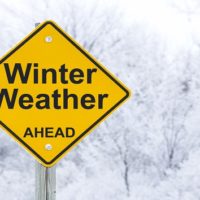
Temperatures remain below freezing across much of the state, and the National Weather Service is forecasting freezing rain across northwest Oregon and southwest Washington starting late tomorrow morning, with ice accumulations between 0.10 – 0.50 inches. State agencies are warning Oregonians to stay off roads and prepare for additional tree damage and power outages. Ice will make for extremely dangerous travel conditions.
ROAD CONDITIONS
Oregon Department of Transportation (ODOT) is asking drivers to consider delaying any travel until later this week if possible. If you must travel, be prepared for conditions as difficult as the weekend. Even in areas where snow and ice began to melt in the daytime, overnight lows are expected to refreeze them on Monday and Tuesday nights. If you must travel, carry chains – even if you have traction tires or four-wheel-drive – plenty of fuel, snacks and blankets in case of delays. Some highways have reached the point where chains are required regardless of four-wheel-drive. Crews are plowing 24/7 and using de-icer by the hundreds of thousands of pounds, as well as sanding packed ice and snow on the roads. However, the amount of ice and extremely low temperatures limit the effectiveness of these tools – especially for vehicles without chains.
If you absolutely must travel, check road conditions by dialing 511 or visiting TripCheck.com. If you decide to travel, plan extra time for your journey and carry emergency supplies including food, water, phone chargers, blankets and warm clothes. Visit ODOT’s winter travel tips page for winter driving car essentials.
POWER OUTAGES
Oregon’s Public Utility Commission (PUC) is anticipating more power outages due to high winds and ice. Cell tower outages challenge communications for cell phone service and the internet service may be impacted by communication fiber and electric outages; use a battery-operated radio to listen to public broadcast stations for weather and situation updates. While utility repair crews are out working to restore power, outages are widespread and may not be back up for some time.
During a Power Outage:
- Contact your electric utility service provider to inform them of an outage. Below is the contact information for the investor-owned utilities regulated by the PUC. If uncertain which utility serves your area, find your utility:
- Portland General Electric – 800-544-1795; Pacific Power – 877-508-5088; Idaho Power – 800-488-6151
- Avoid downed power lines at all costs.
- Stay clear of utility crews working to restore service in your community.
- Use flashlights or battery-operated lanterns for emergency lighting. Do not use candles or other potential fire hazards.
- Turn off lights and unplug electric appliances except for the refrigerator and freezer to help avoid a surge to the system when service is restored. After turning off all the lights, turn one light on to know when power has been restored.
Natural Gas Tips During a Power Outage or Evacuation:
- If required to evacuate, there is no need to shut off your natural gas.
- If your natural gas appliances do not operate properly once electricity is restored, call your natural gas service provider.
- If natural gas service is shut off, do not turn it back on yourself. Call your natural gas service provider to restore service.
- If you smell natural gas, evacuate immediately and call 911.
WARMING SHELTERS
Oregon Department of Human Services’ Office of Resilience and Emergency Management (ODHS OREM) is keeping 211 activated to support warming shelters until temperatures improve. Anyone needing a place to stay warm should call 211 or visit https://211info.org to find open warming centers in the area; 211 can also offer and coordinate transport services to and from warming centers. If you can, check on your neighbors who may need assistance and consider volunteering at a warming center. Look online for volunteer opportunities in your community.
INSURANCE
If your home or car is damaged from the winter storm, the Oregon Division of Financial Regulation recommends calling your insurance company or agent to ask about your policy coverage, exclusions and deductibles before filing a claim. If you have insurance questions or concerns, contact the division’s consumer advocates at 888-877-4894, email dfr.insurancehelp@dcbs.oregon.
STAY INFORMED
Oregon Department of Emergency Management (ODEM) encourages people to stay home, be informed, have an emergency plan and stock an emergency kit.
- Sign up at https://oralert.gov to receive local emergency alerts; if you’ve moved, update your information.
- Track the weather on your radio, TV, weather radio or online at https://weather.gov.
- Have a basic emergency supply kit in case the power goes out. Items to consider include:
- Water (one gallon per person per day for several days, for drinking and sanitation).
- Several days’ supply of non-perishable, easy-to-eat food, like peanut butter, protein and granola bars, jerky, nuts, fruit, pretzels, crackers, beans and rice.
- Manual can opener.
- Cell phone with chargers and a backup battery.
- Battery-powered or hand crank radio or a weather radio.
- Flashlight with extra batteries.
- First-aid kit.
- Sleeping bags or warm blankets.
ODEM advises older adults, people with disabilities and caregivers to consider individual circumstances and specific needs when planning for emergencies and create a support network of people who can help during an event. People should check on elderly neighbors or individuals with special needs who might need additional assistance. Learn more at https://ready.gov/older-adults and https://ready.gov/disability.
# # #















